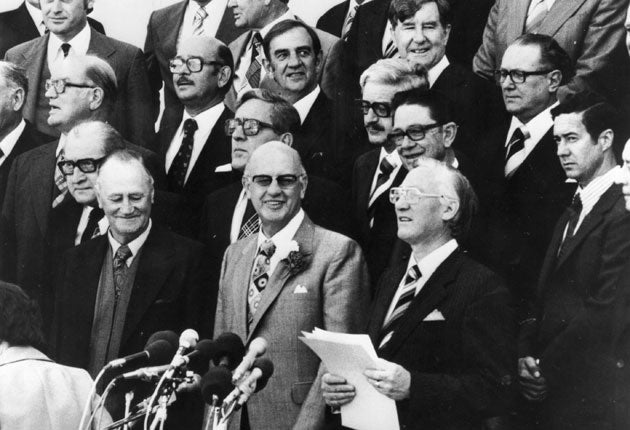Your support helps us to tell the story
From reproductive rights to climate change to Big Tech, The Independent is on the ground when the story is developing. Whether it's investigating the financials of Elon Musk's pro-Trump PAC or producing our latest documentary, 'The A Word', which shines a light on the American women fighting for reproductive rights, we know how important it is to parse out the facts from the messaging.
At such a critical moment in US history, we need reporters on the ground. Your donation allows us to keep sending journalists to speak to both sides of the story.
The Independent is trusted by Americans across the entire political spectrum. And unlike many other quality news outlets, we choose not to lock Americans out of our reporting and analysis with paywalls. We believe quality journalism should be available to everyone, paid for by those who can afford it.
Your support makes all the difference.The National Party, which imposed the yoke of apartheid to divide and rule South Africa for much of the previous century, is being resurrected to contest next year's national elections where it will take on its old nemesis, the African National Congress.
The new incarnation may borrow the old orange sun logo, but that, according to the party spokesman, Juan-Duval Uys, is where the similarities end. The 21st-century National Party (NP) is not interested in a return to the tainted past, he says. What it wants to do is create a credible and strong opposition party that can loosen the ANC's stranglehold on power.
"We want to move on and embrace every race in South Africa," Mr Uys said in an interview yesterday, fresh from re-registering the National Party with electoral authorities. "Our figures show that 85 per cent of those wanting to join are black. They're fed up of corruption and the lack of support from the ANC and want to join us in a non-racial party which represents everyone, not the few."
The resurrected party may trace its roots back to the Afrikaner heartlands of Bloemfontein, where it was founded in 1914, but it will turn its back on the segregation that dominated the reigns of prime ministers Daniel Malan, Hendrick Verwoerd and Pieter Willem Botha. The apartheid system was dismantled in the early 1990s, and Mr Uys is not about to rebuild it.
"We're not going to be the party of P W Botha. We are going to be the party of F W de Klerk, who is still massively respected in South Africa," he said. "The National Party handed over a modern state to the ANC in 1994 despite sanctions, but now look at the country. We need to tackle poverty from the ground up, not with black empowerment deals which benefit the few."
The party claims that Mr de Klerk – the last white leader of South Africa and the man who freed Nelson Mandela – has endorsed the resurrection. But the former president's office has only said he does not oppose the use of the old party name.
It is not the first time the NP has rebranded itself. In 1997, it was renamed the New National Party, but that incarnation lasted just eight years until its sole remaining MP, Marthinus van Schalkwyk, decided to throw his lot in with the ANC and join the government of the current President, Thabo Mbeki.
The NP's official relaunch is scheduled for November and it is aiming to win 50 of the 400 parliamentary seats up for grabs in next year's election, fielding both white and black candidates. Its key policy area will be the spiralling crime rate and draft proposals include public executions for murderers and rapists, as well as forcing prisoners to grow their own food in jail.
But questions remain over the credentials of those spearheading the revamp. Mr Uys, who was not a member of the original NP, has a colourful political past. He represented a Cape Town politician who became embroiled in allegations of sexual favours, bribes and slander.
And many analysts in South Africa are sceptical about whether the NP can really attract the disillusioned white and coloured voters it is targeting, not to mention the so-called "black diamonds", the new prosperous black middle class who might be tiring of the ANC.
Aubrey Matshiqi, a senior political analyst at the Centre for Policy Studies, says: "The majority black population will always associate them with apartheid, and a sizeable proportion of the white population feel betrayed by them for negotiating with the ANC to end apartheid. I do not see them making waves."
To date, the main opposition party has been the Democratic Alliance. It has been vocal in tackling the government on corruption, but beyond that has pitched mostly for white middle-class voters. Much of the real highlighting of government weaknesses is done by civil groups.
This is the gap Mr Uys wants to fill. And he is not daunted by the long odds: "We want to be the underdog and are not bothered by the criticism. We know what the feelings are on the ground."

Join our commenting forum
Join thought-provoking conversations, follow other Independent readers and see their replies
Comments